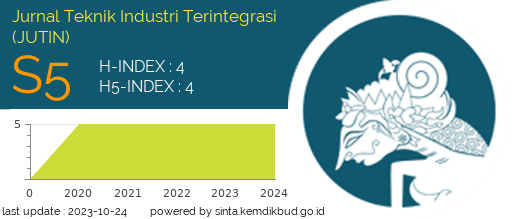Efektivitas Ukuran Sampah Organik Sebagai Pupuk Kompos dengan Metode PLA dan FMEA
DOI:
https://doi.org/10.31004/jutin.v7i3.28600Keywords:
Sampah; Organik; Kompos; PLA; FMEAAbstract
It is hoped that the use and processing of organic waste in Bambe Village can become a new waste utilization and source of income for the residents of Bambe Village. Waste management can be completed by sorting and chopping the wet organic waste into compost using a Takakura basket. This research aims to find strategies for sorting organic waste with a size of 2-4 cm. Apart from that, this research uses the Participatory Learning and Action (PLA) method which is useful for organizing and involving waste producing communities to participate actively or passively in waste management activities. Identifying a problem in this research, the author uses the Failure Mode and Effect Analysis (FMEA) method to answer the main problem of processing system failure and consider improving the technological design that will later be used, with the hope of being able to provide a solution to the residents of Bambe Village and TPS-Integrated waste. is increasing so that it can be used as compost which has economic value and reduces the volume of organic waste.Downloads
Published
2024-07-10
How to Cite
Cahyono, M. D. . (2024). Efektivitas Ukuran Sampah Organik Sebagai Pupuk Kompos dengan Metode PLA dan FMEA. Jurnal Teknik Industri Terintegrasi (JUTIN), 7(3), 1468–1477. https://doi.org/10.31004/jutin.v7i3.28600
Issue
Section
Articles of Research
License
Copyright (c) 2024 Manggi Dwi Cahyono

This work is licensed under a Creative Commons Attribution-ShareAlike 4.0 International License.





